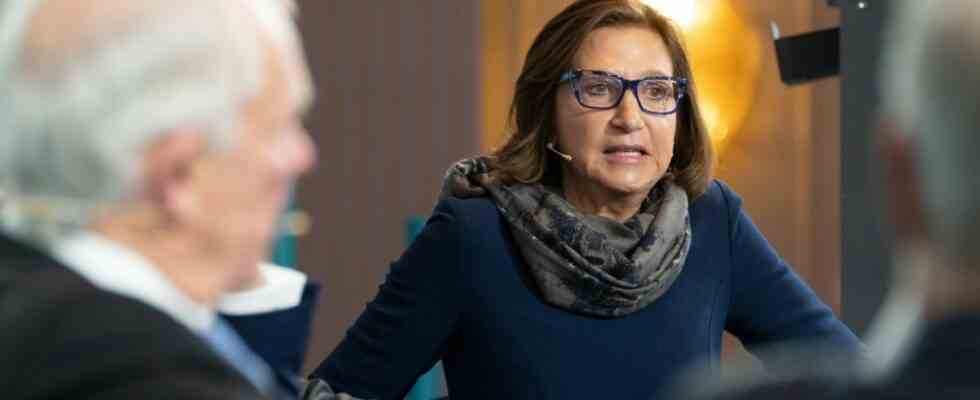The big question is: where is the country and where is Europe at the moment? Are we still in the midst of a perfect storm, where the fringes of the Corona epidemic coincide with a major war on European soil, 30 years after the last war, that in collapsing Yugoslavia? Will inflation, recession, electricity and gas shortages and perhaps also the military threat destroy society – including the economy – for many years to come? Or is there light on the horizon? Chancellor Olaf Scholz (SPD) has conjured up optimism, as far as his Hanseatic mind allows it. Right? The people from science and business from Dubai and Turin, Amsterdam, Munich and Berlin, who sat together immediately afterwards, listened carefully to Scholz. They express doubts, but also a lot of confidence.
What does science think?
Clemens Fuest is one of the reminders. The Ifo Institute, which he directs, publishes economic data every few weeks, and they don’t look good these months: double-digit inflation rates by next spring, after all he isn’t assuming a 20 percent scenario. But what if the gas runs out, even if the Chancellor is so optimistic? Fuest says he’s always asked why he has to publish such negative numbers at all: “It pulls people down,” he heard.
But that’s the job of an economist, especially since there is far too little hard live information in the country to assess the crises, says the economist from Munich. Nobody knows exactly how the energy supply is doing, nobody has a good overview of the value chains in industry: What happens if this or that fails? “We lack data,” says Fuest. And because the short-term crises have to be overcome at the same time, the long-term is losing sight of. His example: LPG terminals are now being built, but forget that electricity generation will come under fundamental stress in the face of electromobility. Quasi the crisis of the day after tomorrow.
What does the mobility industry say?
“We’re in the middle of the storm,” says Margret Suckale. But the former Bahn board member and current multi-supervisory board member has a significantly different emphasis than Fuest, is somewhat on Scholz’s line: Yes, there are some problems with crisis management, such as over-regulation. And above all, an imminent social split must be prevented. But the principle of the self-fulfilling prophecy always applies – in other words, more self-confidence and thus also trust in the economy, warns Suckale. In this respect, it is important to further work out the strengths of German companies, which usually have an “intrinsic motivation” to overcome the crisis.
Her colleague Tim Clark, CEO of the Emirates airline, says: What is currently going on is the greatest economic drama he has ever seen; But his greatest fear is something else: nuclear war. And yet he is confident: “We’ll get through!” Clark’s word carries weight, if only because of his long experience: the Brit, who lives in Dubai, is 73 years old. His argument: He experiences enormous “resilience” in companies, in many people, in politics, but also in many customers. Never in the history of Emirates has there been so much demand for air travel as at the moment, despite fairly high prices. “A boom in all segments”, despite all the crises. This is also a consequence of globalization.
What does the financial industry say?
Steven van Rijswijk reminds us what a crisis really is: First, says the CEO of the Dutch bank ING, there are the people in Ukraine. And then there are those who suffer from inflation, also from the increased food prices in areas that are not even considered in Europe. And finally, there is the greatest challenge of all: the climate crisis.
Because of the war in Ukraine, there is a need for short-term solutions to the energy issue, says van Rijswijk, referring to Scholz’s plans for liquid gas terminals. But what do these investments in fossil infrastructure mean in the medium and long term? How do you manage a conversion in energy-intensive industries? How do radical climate protection and traditional industries come to a common denominator? “I worry about it.”
His colleague Andrea Sironi, CEO of Generali Insurance and President of Bocconi University in Milan, says: The economic situation in Europe is still bad at the moment, but a peak is in sight. Next spring. After that, inflation will drop by five or six percentage points, according to the economist, who admits he doesn’t have a crystal ball either. But he sees in Italy, as in Germany, how one can get rid of Russian gas, the factor that plunged the economy into crisis. And at the same time there is a chance in the fight against the climate crisis: the insurance industry alone manages assets of eleven trillion euros. Money that could play a “crucial role” in a green transformation.

